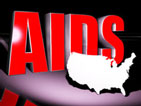FCNNEWSSOURCE
- Can we reverse the AIDS epidemic? (FCN, 11-08-2006)

WASHINGTON (FinalCall.com) – Leading Black lawmakers, civil rights leaders and medical experts called on the federal government Nov. 16 to adopt and implement a new blueprint to address the HIV/AIDS crisis in the Black community.
The plan is outlined in a new report, “African Americans, Health Disparities and HIV/AIDS: Recommendations for Confronting the Epidemic in Black America,” released by the National Minority AIDS Council (NMAC) in advance of World AIDS Day (Dec. 1).
Since the beginning of the HIV/AIDS epidemic 25 years ago, Black people have been overrepresented among those living with and dying from AIDS. The disease continues to affect Blacks more than any other racial/ethnic group in the United States. Today, Blacks comprise only 13 percent of the U.S. population but account for over half of all new HIV/AIDS diagnoses. Over 200,000 Black people have died of AIDS, half a million are now living with HIV and Blacks are 10 times more likely than Whites to have AIDS. Confronting this national health disparity is a paramount concern.
“It is a national tragedy that the AIDS crisis has continued to be unabated in the African American community for so many years,” said Beny Primm, M.D., NMAC’s chair emeritus. “There is a danger that we view AIDS as a problem that only affects Africa, when it remains a real and growing danger in our own backyard. That kind of complacency is killing people and it has to stop. This plan of action shows us the path forward to reversing this national disparity.”
NMAC’s report, a comprehensive analysis of the complex social, economic and personal factors that underpin the Black AIDS epidemic, was written by Robert Fullilove, Ed.D., associate dean for Community and Minority Affairs and Professor at Columbia University’s Mailman School of Public Health. Its recommendations are endorsed by a blue-ribbon expert advisory panel of some 30 Black leaders that includes, among others, Julian Bond (chairman, NAACP), Dr. Louis Sullivan (former Secretary of Health and Human Services), Dr. David Satcher (former U.S. Surgeon General), Marian Wright Edelman (president, Children’s Defense Fund) and Marc Morial (president, National Urban League).
“At this time each year, the U.S. Centers for Disease Control and Prevention releases new national HIV statistics and we see an ever-increasing toll of AIDS on the African American community,” said Dr. Fullilove. “And each year, we ask why AIDS is hitting Black Americans hardest. Our analysis identifies the forces that drive the epidemic in Black America, and recommends proven, practical and affordable strategies that government must implement without delay to protect the health of African Americans.
” “The U.S. government is showing leadership in addressing the global pandemic, but we are failing to confront AIDS here at home,” said Congresswoman Donna Christensen (D-U.S. Virgin Islands), chair of the Congressional Black Caucus’ Health Braintrust. “Are we willing to sacrifice another half-million African American lives to this entirely preventable disease? It is up to the members of the newly elected 110th Congress to answer this question.”
The report indicates numerous factors that contribute to the prevalence of HIV/AIDS in the Black community, such as AIDS cases among incarcerated persons are more than three times that of the general population, and Blacks are disproportionately represented in U.S. prisons. The report notes that there is only one HIV program targeted for Black gay men. Among Blacks, one in five (19 percent) new HIV infections is attributed to the sharing of contaminated needles through injection drug use.
The report presents five policy solutions: (1) Eliminate marginalization, stigma, discrimination and violence against Black gay men; (2) Reduce impact of incarceration as driver of new HIV infections; (3) Reduce role of injection drug use in sustaining the AIDS epidemic; (4) Expand proven HIV prevention, diagnosis and care programs; and (5) Stabilize communities by increasing affordable housing.
Keys to stopping the spread of HIV/AIDS in the Black community, according to the report, include providing routine, voluntary HIV testing and prevention resources for prisoners upon entry and release; increasing investment in education and substance abuse programs designed to prevent the use of injection drugs and establishing needle-exchange programs to minimize the risk of infection from sharing needles.












